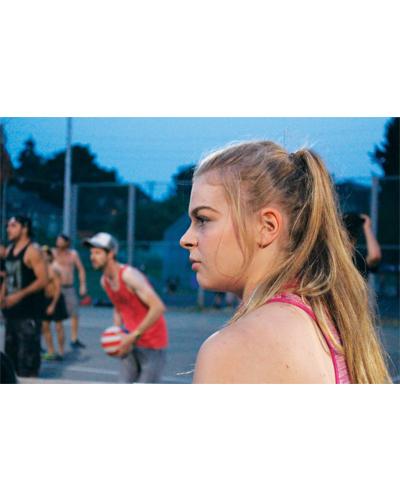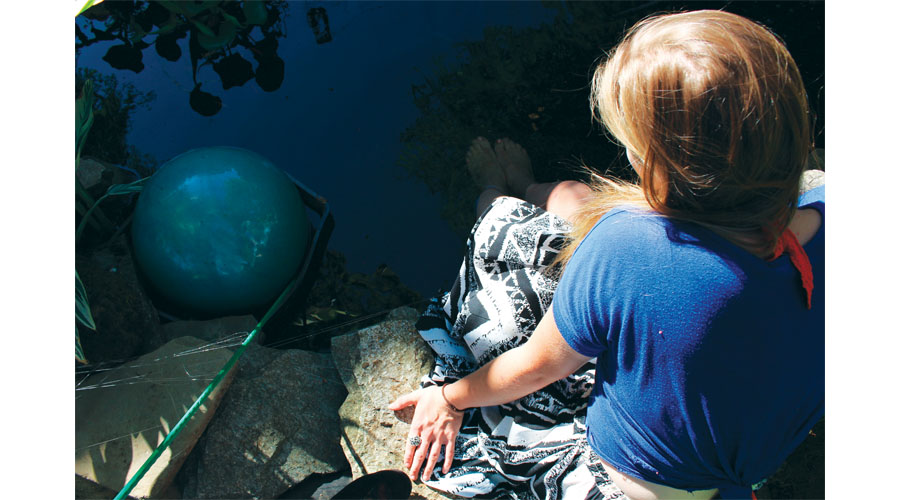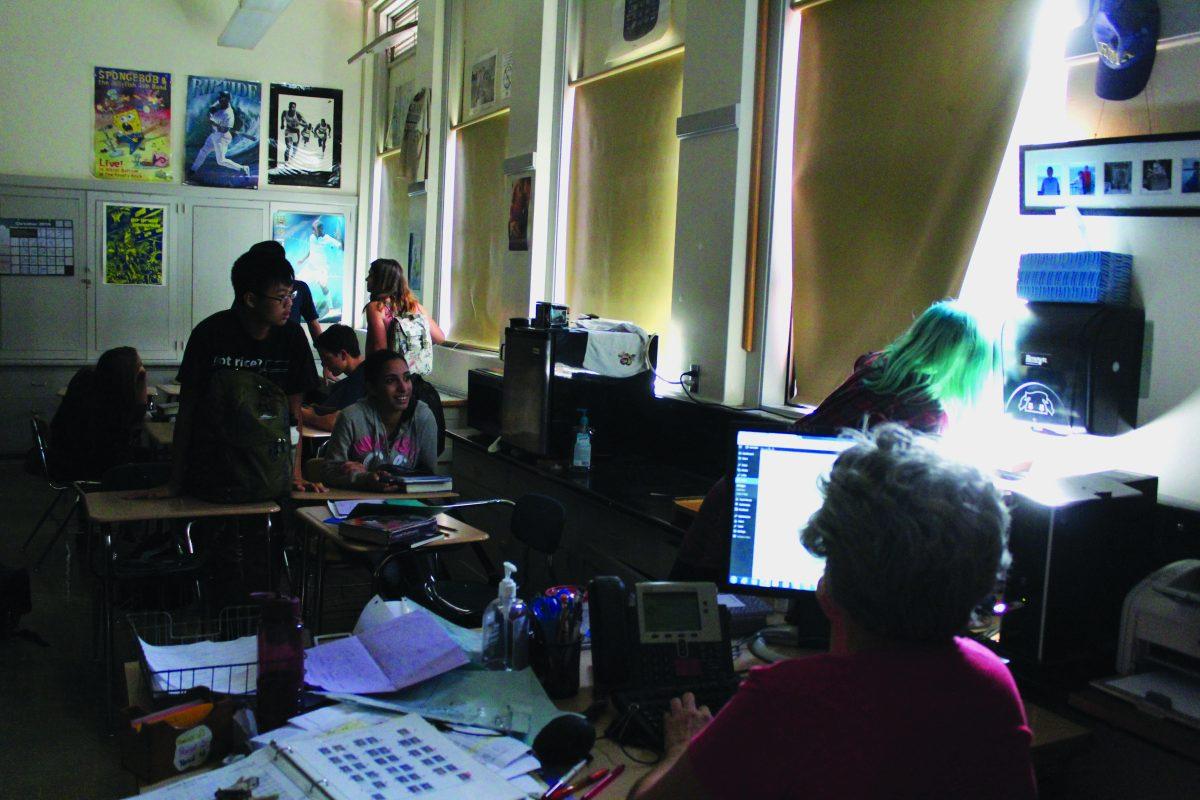Grant High School sophomore Violet Summersby woke up feeling like her insides were exploding. She screamed for her mom, who immediately knew something had gone wrong – again. As her mother helped her stagger to the car, Summersby prepared for her second visit to the emergency room in 24 hours.
In the waiting room, Summersby struggled to remain conscious. A series of worst-case scenarios played through her mind.
The night before, she had been in the same emergency room with similar symptoms, but her mom says the doctor on call had made a mistake. By missing the appendicitis and diagnosing Summersby with ovarian cysts, her appendix burst and put her life in danger, her mom says.
Summersby, who previously strived to be independent, was forced to switch gears after her medical emergency. Her once distant family began cooperating to give Summersby the support she needed. One mistake could affect each of their lives – they could no longer take their relationships for granted.
Born in Portland, Summersby grew up with a single mom. Her parents separated soon after having her in their late teens. There’s been a disconnect between them ever since.
Despite discomfort between her parents, Summersby had a positive upbringing. She developed an interest in sports and nature at a young age, both of which helped her develop a close group of friends when she started high school.
“She loves to help people and cheer (them) up when they’re sad,” says Summersby’s friend, Quinn Gallagher. She’s always been there to help friends with homework or talk through issues. During her frequent visits to the roller rink, she’s known for offering encouragement to uncertain skaters.
Though Summersby’s selfless nature made the beginnings of her freshman year easy, it in no way prepared her for the time in the hospital that followed her misdiagnosis.
“It was kind of like a nightmare,” she says. Her first weekbeing sick was an assortment of scattered memories. She recalls feverishly giggling during an ambulance ride to Providence Hospital as a result of the pain pills they had given her to prepare for a surgery. She also remembers being frightened by her own reflection that she saw in the cabinets next to her.
For three days, she was confined to a diet of water and lost 15 pounds in one week. “It was insane putting on my clothes and seeing them hang off me,” Summersby recalls.
On top of the physical torment, she had to deal with emotional turmoil. Being in the hospital had put
Summersby in a depressed state. She began blaming herself for being there. “At the start, I was in a very painful place, so it was a lot of putting myself down,” she explains. “There wasn’t really a point where it got better.”
Summersby’s only solace was the support she got from her family. Despite their differences, her parents were in the hospital every day. Her dad, Sean Summersby, would watch movie marathons with her; her mom would brush her hair. Even her two grandmothers started cracking jokes with one another. “It brought all the families together on the same page,” says her mother, Audrey Goldfarb.
After she was admitted, Summersby’s friends flocked to the hospital – sometimes 15 to 20 people would want to visit in a day.
“It was just scary,” says Grant sophomore Lillian Williams. “Walking up to the hospital, this big building, and knowing that there’s a bunch of sick people in there and that one of your friends is one of those sick people.”
Even from her hospital bed, Summersby put the well-being of her friends before her own. She would do her best to sit up in bed and smile when they came to visit, or go on walks with them around the hospital if she had enough strength. Even in her weakest condition, appearing strong was important to her. “I was trying to do things that might be fun for them when really they were just trying to help me,” she explains.
While Summersby was in a haze of more than five pain medications, life outside the hospital continued. Due dates came and went, destroying the grades that she had started the year with. “I’m in the hospital and I’m watching my grades just plummet on Synergy,” says Summersby.
Finally, after a week in the hospital and a week of bed rest, she was able to return to school. She struggled to get her grades up to where they were before. With every assignment she completed, more came flowing in.
“I just think it’s really hard once you’re out of the school scene,” explains Summersby’s freshman English teacher Stephanie D’Cruz. “So much happens in a day of school – seven or eight classes. And on top of being sick and feeling tired, I do think it can be really hard for people to catch back up.”
Summersby also had to adjust physically to life outside of the hospital. Before her misdiagnosis, she was involved in a variety of activities including choir, ultimate Frisbee, cross country, soccer, cooking, writing, track and even dodgeball.
She was eager to be active again, but her hospital stay had left her weak. Walking down the hallway was almost too much to handle.
Slowly, she recovered and was able to begin the sports she had left behind. Her attitude brightened and she began to return to her old self.
Unfortunately, just as Summersby’s life became normal, she had to revisit the hospital. The doctors had decided to wait until the bile from the burst appendix was gone to remove her appendix. During the procedure, they realized her anatomy was unusual. Instead of being nestled in her lower abdomen, Summersby’s appendix had moved toward her intestines, making it significantly difficult for the doctors to remove. Ultimately, the surgery was successful, but it had repercussions.
Only half a day after the surgery, she began to feel immense pain coupled with fevers reaching nearly 105 degrees. Her medication wasn’t working and attempts to lower her fever were futile.
After going in for an exploratory surgery, the doctors discovered that the cause of Summersby’s bad reaction was likely because of a leftover infection from her appendix bursting. To fully recover, she would need to spend another week in the hospital.
“It was kind of like I got lied to in a way,” remarks Summersby, who is 15. “I was told I would have to be in the hospital for 48 hours and the fact that I had to be there for six days was just kind of a shock.”
This time around, Summersby knew how to deal with hospital life. She had a plan for getting better, and she knew it couldn’t include putting others before herself. She cut down on visitors, got as much sleep as possible and was more proactive with her schoolwork.
She finally accepted that she needed to be taken care of. She began leaning on others for help. If the noises of the hospital woke her up in the middle of the night, she didn’t try to get through it on her own. Instead, she held her dad’s hand.
Despite her plan for recovery, Summersby grew frustrated with not being able to do anything for herself. One day, she decided to take matters into her own hands and scooted herself out of bed and into a wheelchair. “I was too slow to just use my arms, so I did this funny thing where I just kicked my legs back and forth,” Summersby says. “I’m trying to go as fast as I can down the hallway. And people are moving out of the way so I can go.”
Previously, Summersby wasn’t even able to sit up without assistance. “I can’t wait,” she says. “I’m done with everyone helping me. I’m just going to do it myself.”
Today, she is happy to be out of a hospital bed. Despite everything, she manages to view the experience in a positive light. She feels her time in the hospital gave her a new outlook on life. “It’s OK to ask for help now,” she says. “It was kind of immature for me to think I could always do everything on my own and that I didn’t need anyone.”
Even Summersby’s parents learned something from her hospital experience. To deal with the ordeal, they began to depend on each other. “I think you just put down those petty differences and focus on the reasons you were there, which was for her,” says her dad, Sean Summersby.
It’s not all positive. Summersby’s family is struggling with hospital bills. According to Goldfarb, the hospital won’t admit its mistake regarding the misdiagnosis; instead, it waived the $4,000 charge for her first night in the hospital. The family still has to pay $6,000 for the rest of her stay.
Summersby is a part of Grant’s Women’s Ensemble Choir and intends to keep up with the same extracurricular activities and sports that she began her freshman year.
For her part, she doesn’t resent her misdiagnosis. She has begun to let go of what she calls “the unanswerable questions” of why it happened to her.
She believes her time in the hospital gave her the ability to face challenges she may face in the future.
“I don’t believe in fate or that kind of thing,” she says. “Everyone has to jump through hurdles. Some are bigger than others and this was one of mine.”







































